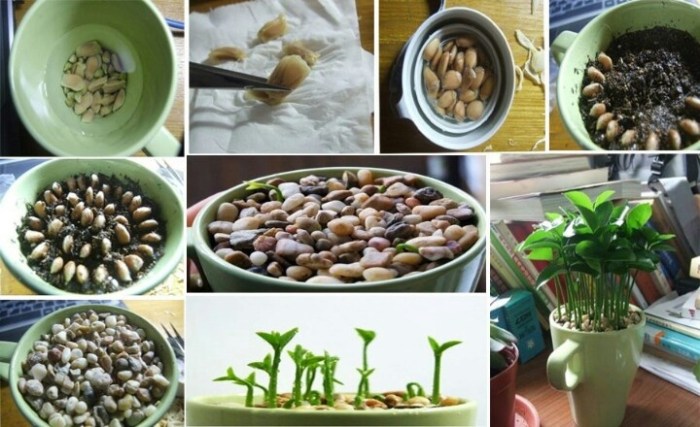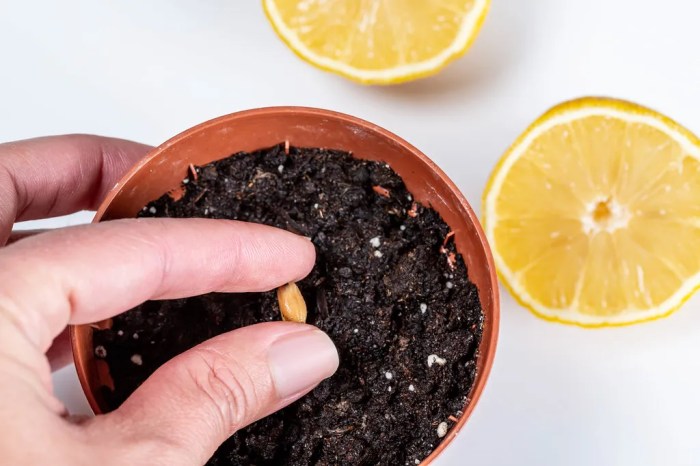Growing Lemon Trees from Seed: A Comprehensive Guide: Can You Plant Lemon Seeds In A Pot
Can you plant lemon seeds in a pot – Growing lemon trees from seed can be a rewarding, albeit challenging, endeavor. While it’s significantly easier to propagate lemons through cuttings, the process of nurturing a lemon tree from seed offers a unique connection to the plant’s life cycle. This guide provides a step-by-step approach, covering everything from seed germination to ongoing care and troubleshooting.
Lemon Seed Germination Process, Can you plant lemon seeds in a pot

Source: pinimg.com
Successful lemon seed germination hinges on replicating the conditions of a natural environment. This involves careful attention to temperature, moisture, and light exposure. Direct sowing and pre-soaking are two common methods, each with its own advantages and disadvantages.
Preparing lemon seeds for planting involves removing the pulp and allowing them to dry slightly before planting. This prevents fungal growth and promotes better germination.
To increase the success rate, consider using a seed-starting mix, maintaining consistent moisture, and providing adequate warmth. Patience is key; germination can take several weeks.
| Germination Method | Preparation | Advantages | Disadvantages |
|---|---|---|---|
| Direct Sowing | Seeds sown directly into the potting mix. | Simpler process, less handling of seeds. | Lower germination rate, potential for uneven germination. |
| Pre-Soaking | Seeds soaked in water for 12-24 hours before sowing. | Higher germination rate, faster germination. | Requires extra time, increased risk of fungal growth if not handled properly. |
Potting and Soil Requirements for Lemon Seedlings

Source: backyardbossimages.com
Selecting the right pot and soil is crucial for the healthy development of your lemon seedling. The pot should be well-draining to prevent root rot, and the soil should be rich in organic matter and well-aerated.
A slightly acidic soil pH (around 6.0-6.5) is ideal for lemon trees. Using a high-quality potting mix designed for citrus plants is recommended. Poor drainage can lead to root rot, while an unsuitable pH can affect nutrient uptake.
Illustration: Imagine a six-inch terracotta pot with drainage holes at the base. The pot is filled with a dark, loose potting mix that appears moist but not soggy. A small lemon seedling, with a few small leaves, is gently nestled in the center of the pot. The soil around the seedling is lightly pressed down, ensuring good contact with the roots.
The overall impression is one of health and proper support for the delicate seedling.
Light and Watering Needs of Young Lemon Plants
Young lemon plants require careful management of light and water. Providing the right amount of each is essential for healthy growth and development. Overwatering or underwatering can have detrimental effects on the plant’s health.
Yes, you can certainly plant lemon seeds in a pot, though it’s a longer process than using a cutting. The success rate varies, and you might be curious about other fruits; for instance, you may wonder, as discussed in this article, can you plant honeydew seeds. Returning to lemons, remember that consistent watering and sunlight are key to germination and healthy growth in your potted lemon tree.
- Light: Young lemon seedlings benefit from bright, indirect sunlight. Avoid direct, intense sunlight, which can scorch the leaves. A south-facing window (in the Northern Hemisphere) with some shade during the hottest part of the day is ideal.
- Watering: Water thoroughly when the top inch of soil feels dry to the touch. Avoid letting the soil completely dry out or become waterlogged. The frequency of watering will depend on factors like pot size, temperature, and humidity.
- Signs of Overwatering: Yellowing leaves, wilting, and soggy soil are indicative of overwatering. Underwatering is characterized by dry, brittle leaves and wilting.
Growth and Maintenance of Lemon Seedlings
Growing lemon seedlings from seeds presents certain challenges. Regular monitoring for pests and diseases, as well as proper fertilization and repotting, are essential for their survival and growth.
Nutrient deficiencies can manifest in various ways, such as yellowing leaves or stunted growth. Regular fertilization with a balanced citrus fertilizer is crucial for providing the necessary nutrients.
Repotting is necessary as the seedling grows larger. This involves carefully removing the seedling from its current pot, placing it in a larger pot with fresh potting mix, and gently filling the spaces around the roots.
- Gently remove the seedling from its pot.
- Inspect the roots and trim any damaged or circling roots.
- Place the seedling in a larger pot with fresh potting mix.
- Fill in the spaces around the roots, ensuring good contact with the soil.
- Water thoroughly after repotting.
Troubleshooting Common Problems in Lemon Seedlings
Several issues can affect the health of lemon seedlings. Understanding the causes and symptoms of these problems is crucial for effective treatment.
| Problem | Cause | Symptoms | Solution |
|---|---|---|---|
| Root Rot | Overwatering, poor drainage | Wilting, yellowing leaves, mushy roots | Improve drainage, reduce watering frequency, repot in fresh soil. |
| Nutrient Deficiency | Lack of essential nutrients | Yellowing leaves, stunted growth | Fertilize with a balanced citrus fertilizer. |
| Pest Infestation | Aphids, spider mites | Visible insects, leaf damage | Treat with insecticidal soap or neem oil. |
Essential Questionnaire
How long does it take for a lemon seed to germinate?
Germination can take anywhere from a few weeks to several months, depending on conditions.
Can I use tap water to water my lemon seedling?
It’s best to use filtered or distilled water to avoid chlorine and other chemicals that may harm the plant.
What should I do if my lemon seedling’s leaves are yellowing?
Yellowing leaves can indicate overwatering, underwatering, nutrient deficiencies, or disease. Investigate the potential causes and adjust your care accordingly.
How often should I fertilize my lemon seedling?
Fertilize regularly during the growing season using a balanced citrus fertilizer, following package instructions.
